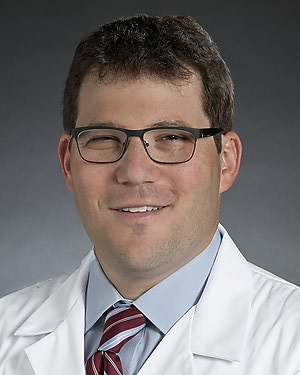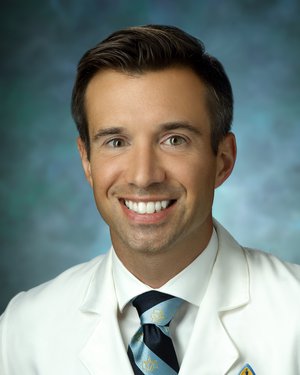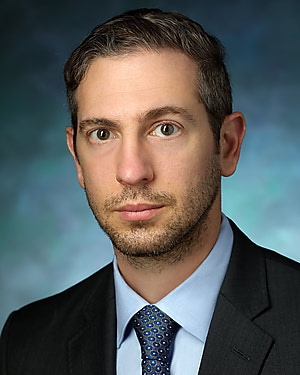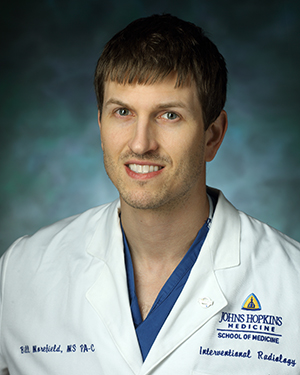For over 25 years, we have been actively treating patients and families with HHT.
The Johns Hopkins HHT Center of Excellence is one of the pioneering treatment centers in North America that helps to provide comprehensive coordination of care necessary for treating patients with HHT. Our Center of Excellence is committed to superb patient and family care as well as state-of-the-art research. Our goals are to improve the health of our patients and families as well as to better the lives of those patients in the world that we may never meet.
We empower patients, families, and providers through education and community awareness
We hold clinical and research expertise in a broad range of conditions related to HHT
Our center includes over 30 full-time faculty members specializing in HHT
Our multidisciplinary team partners with patients to provide holistic care based on individual needs
Request an Appointment
New and Current Patients
Sophia Kemble, MSN, RN
HHT Nurse Coordinator
Phone: 410-614-3934
Email: [email protected]
What is HHT?
Hereditary Hemorrhagic Telangiectasia (HHT) is a genetic disorder of the blood vessels and affects approximately 1 in 5,000 people. HHT is characterized by nosebleeds, telangiectasias, and arteriovenous malformations (AVMs) and affects people of all genders and racial and ethnic backgrounds. The disorder is also sometimes referred to as Osler-Weber-Rendu (OWR) syndrome after the physicians who first described HHT over 100 years ago.

Today, HHT remains a disease that is often misdiagnosed or misunderstood. Despite tremendous progress to raise the worldwide awareness of HHT, many patients and clinicians do not fully understand all of the disease manifestations.
Cure HHT is a foundation that has consistently been at the center of national and global efforts since its establishment in 1991. It was founded by tenacious and passionate physicians and patient families with the aim of advocating for patients and their families, raising awareness of HHT, guiding and funding critical research, creating lasting collaborations, and encouraging scientists to work on new treatments.
Our Team
Clifford Weiss, M.D.
Director of the HHT Center of Excellence

Nicholas Rowan, M.D.
Associate Director of the HHT Center of Excellence

Panagis Galiatsatos, M.D., M.H.S.
Associate Director of the HHT Center of Excellence

Sophia Kemble, MSN, RN
HHT Program Coordinator
[email protected]

Bill Morefield, PA

About our Practice
The Johns Hopkins HHT Center of Excellence clinics are located throughout the Johns Hopkins medical campus. Our doctors are board-certified and full-time faculty at the Johns Hopkins University School of Medicine with particular expertise in the clinical care of adults and children with HHT.
Refer a Patient
Physicians and new or returning patients may call the HHT Nurse Coordinator Sophia Kemble directly at 410-614-3934 or at [email protected].
Emergencies
To speak with one of our HHT experts about a patient, please call the Hopkins Access Line (HAL) at 410-955-5000 and page the on-call Interventional Radiology Fellow. The HAL is for physician-to-physician consult only.
- Hereditary Hemorrhagic Telangiectasia (also known as Olser-Weber-Rendu) is a multi-system vascular dysplasia. It is uncommon but not rare.
- Telangiectases and arteriovenous malformations (AVMs) are the characteristic lesions.
- Location of lesions and severity of symptoms is highly variable and significantly under-diagnosed in affected individuals.
- Most commonly affected organs from most to least common are, are the nose, lungs, GI tract, brain, liver, and spine, respectively.
- HHT is an autosomal dominant genetic disorder. Denovo mutations are rare. A targeted family history shows almost all cases to be familial.
- HHT is heterogenic. Defects in at least three genes cause HHT.
- The severity of epistaxis or dermal telangiectases does not correlate with the likelihood to have cerebral or pulmonary AVMs.
Current Clinical Trials
Highlighted News and Publications
-
Farhan A, Latif MA, Minhas A, Weiss CR. Cardiac and Hemodynamic Manifestations of Hereditary Hemorrhagic Telangiectasia. Int J Angiol. 2022 Jul 9;31(2):75-82. doi: 10.1055/s-0042-1745842. PMID: 35923582; PMCID: PMC9341259.
Fanning RP, Strout S, Rowan NR, Weiss CR, Galiatsatos P. The Impact on COVID-19 by Intravenous Bevacizumab Used for Hereditary Hemorrhagic Telangiectasia: A Case Report. J Med Cases. 2022 Jun;13(6):307-311. doi: 10.14740/jmc3948. Epub 2022 Jun 2. PMID: 35837077; PMCID: PMC9239510.
Galiatsatos P, Wilson C, O'Brien J, Gong AJ, Angiolillo D, Johnson J, Myers C, Strout S, Mathai S, Robinson G, Rowan NR, Weiss CR. A lack of race and ethnicity data in the treatment of hereditary hemorrhagic telangiectasia: a systematic review of intravenous bevacizumab efficacy. Orphanet J Rare Dis. 2022 Jun 13;17(1):220. doi: 10.1186/s13023-022-02371-0. PMID: 35698080; PMCID: PMC9195340.
Lam S, Guthrie KS, Latif MA, Weiss CR. Genetic counseling and testing for hereditary hemorrhagic telangiectasia. Clin Genet. 2022 Mar;101(3):275-284. doi: 10.1111/cge.14050. Epub 2021 Aug 24. PMID: 34415050.
Farhan A, Yuan F, Partan E, Weiss CR. Clinical manifestations of patients with GDF2 mutations associated with hereditary hemorrhagic telangiectasia type 5. Am J Med Genet A. 2022 Jan;188(1):199-209. doi: 10.1002/ajmg.a.62522. Epub 2021 Oct 5. PMID: 34611981.
Ring NY, Latif MA, Hafezi-Nejad N, Holly BP, Weiss CR. Prevalence of and Factors Associated with Arterial Aneurysms in Patients with Hereditary Hemorrhagic Telangiectasia: 17-Year Retrospective Series of 418 Patients. J Vasc Interv Radiol. 2021 Dec;32(12):1661-1669. doi: 10.1016/j.jvir.2021.08.018. Epub 2021 Aug 31. PMID: 34478850.
Kolarich AR, Solomon AJ, Bailey C, Latif MA, Rowan NR, Galiatsatos P, Weiss CR. Imaging Manifestations and Interventional Treatments for Hereditary Hemorrhagic Telangiectasia. Radiographics. 2021 Nov-Dec;41(7):2157-2175. doi: 10.1148/rg.2021210100. PMID: 34723698.
Al-Samkari H, Kasthuri RS, Parambil JG, Albitar HA, Almodallal YA, Vázquez C, Serra MM, Dupuis-Girod S, Wilsen CB, McWilliams JP, Fountain EH, Gossage JR, Weiss CR, Latif MA, Issachar A, Mei-Zahav M, Meek ME, Conrad M, Rodriguez-Lopez J, Kuter DJ, Iyer VN. An international, multicenter study of intravenous bevacizumab for bleeding in hereditary hemorrhagic telangiectasia: the InHIBIT-Bleed study. Haematologica. 2021 Aug 1;106(8):2161-2169. doi: 10.3324/haematol.2020.261859. PMID: 32675221; PMCID: PMC8327711.
Latif MA, Sobreira NLD, Guthrie KS, Motaghi M, Robinson GM, Shafaat O, Gong AJ, Weiss CR. Clinical and molecular characterization of patients with hereditary hemorrhagic telangiectasia: Experience from an HHT Center of Excellence. Am J Med Genet A. 2021 Jul;185(7):1981-1990. doi: 10.1002/ajmg.a.62193. Epub 2021 Mar 26. PMID: 33768677.
Bailey CR, Rowan NR, Chaturvedi S, Weiss CR. Concurrent Hereditary Hemorrhagic Telangiectasia and Hereditary Hemochromatosis: A Case Report. Am J Med. 2021 Mar;134(3):e205-e206. doi: 10.1016/j.amjmed.2020.08.038. Epub 2020 Oct 13. PMID: 33058785.
England RW, Weiss CR. Pulmonary arteriovenous malformation in a pediatric patient with epistaxis and hypoxemia. Radiol Case Rep. 2020 Aug 3;15(10):1759-1763. doi: 10.1016/j.radcr.2020.07.026. PMID: 32774576; PMCID: PMC7403889.
Bailey CR, Arun A, Towsley M, Choi WK, Betz JF, MacKenzie S, Areda MA, Duvvuri M, Mitchell S, Weiss CR. MVP™ Micro Vascular Plug Systems for the Treatment of Pulmonary Arteriovenous Malformations. Cardiovasc Intervent Radiol. 2019 Mar;42(3):389-395. doi: 10.1007/s00270-018-2106-x. Epub 2018 Nov 14. PMID: 30430217.
Bishop JC, Britton JF, Murphy AM, Sule S, Mitchell S, Takemoto C, Collaco JM, Karnsakul W, Cuffari C, Dietz E, Bodurtha J. Juvenile Idiopathic Arthritis Associated with Combined JP-HHT Syndrome: A Novel Phenotype Associated with a Novel Variant in SMAD4. J Pediatr Genet. 2018 Jun;7(2):78-82. doi: 10.1055/s-0037-1609060. Epub 2017 Dec 29. PMID: 29707409; PMCID: PMC5916806.
Halderman AA, Ryan MW, Clark C, Sindwani R, Reh DD, Poetker DM, Invernizzi R, Marple BF. Medical treatment of epistaxis in hereditary hemorrhagic telangiectasia: an evidence-based review. Int Forum Allergy Rhinol. 2018 Jun;8(6):713-728. doi: 10.1002/alr.22094. Epub 2018 Feb 2. PMID: 29393992.
Mu W, Cordner ZA, Yuqi Wang K, Reed K, Robinson G, Mitchell S, Lin D. Characterization of pulmonary arteriovenous malformations in ACVRL1 versus ENG mutation carriers in hereditary hemorrhagic telangiectasia. Genet Med. 2018 Jun;20(6):639-644. doi: 10.1038/gim.2017.160. Epub 2017 Oct 19. PMID: 29048420.
Bailey CR, Duvvuri M, Weiss CR. Pulmonary Arteries: Exclusion (Pulmonary AVM). Diagnostic Imaging Interventional Procedures. 2nd Ed. Elsevier. 2018.
Bailey CR, Weiss CR. Pulmonary Arteries: Revascularization (PE Thrombolysis). Diagnostic Imaging Interventional Procedures. 2nd Ed. Elsevier. 2018.
Baxter M, Erby L, Roter D, Bernhardt BA, Terry P, Guttmacher A. Health screening behaviors among adults with hereditary hemorrhagic telangiectasia in North America. Genet Med. 2017 Jun;19(6):659-666. doi: 10.1038/gim.2016.161. Epub 2016 Oct 13. PMID: 27735923; PMCID: PMC5391304.
Jeon H, Cohen B. Lack of efficacy of topical timolol for cutaneous telangiectasias in patients with hereditary hemorrhagic telangiectasia: Results of a pilot study. J Am Acad Dermatol. 2017 May;76(5):997-999. doi: 10.1016/j.jaad.2016.11.055. PMID: 28411778.
Whitehead KJ, Sautter NB, McWilliams JP, Chakinala MM, Merlo CA, Johnson MH, James M, Everett EM, Clancy MS, Faughnan ME, Oh SP, Olitsky SE, Pyeritz RE, Gossage JR. Effect of Topical Intranasal Therapy on Epistaxis Frequency in Patients With Hereditary Hemorrhagic Telangiectasia: A Randomized Clinical Trial. JAMA. 2016 Sep 6;316(9):943-51. doi: 10.1001/jama.2016.11724. PMID: 27599329.
Yin LX, Reh DD, Hoag JB, Mitchell SE, Mathai SC, Robinson GM, Merlo CA. The minimal important difference of the epistaxis severity score in hereditary hemorrhagic telangiectasia. Laryngoscope. 2016 May;126(5):1029-32. doi: 10.1002/lary.25669. Epub 2015 Sep 22. PMID: 26393959.
Kim H, Nelson J, Krings T, terBrugge KG, McCulloch CE, Lawton MT, Young WL, Faughnan ME; Brain Vascular Malformation Consortium HHT Investigator Group. Hemorrhage rates from brain arteriovenous malformation in patients with hereditary hemorrhagic telangiectasia. Stroke. 2015 May;46(5):1362-4. doi: 10.1161/STROKEAHA.114.007367. Epub 2015 Apr 9. PMID: 25858236; PMCID: PMC4415515.
Merlo CA, Yin LX, Hoag JB, Mitchell SE, Reh DD. The effects of epistaxis on health-related quality of life in patients with hereditary hemorrhagic telangiectasia. Int Forum Allergy Rhinol. 2014 Nov;4(11):921-5. doi: 10.1002/alr.21374. Epub 2014 Aug 21. PMID: 25145809.
Reh DD, Yin LX, Laaeq K, Merlo CA. A new endoscopic staging system for hereditary hemorrhagic telangiectasia. Int Forum Allergy Rhinol. 2014 Aug;4(8):635-9. doi: 10.1002/alr.21339. Epub 2014 Apr 29. PMID: 24782401.
Reh DD, Hur K, Merlo CA. Efficacy of a topical sesame/rose geranium oil compound in patients with hereditary hemorrhagic telangiectasia associated epistaxis. Laryngoscope. 2013 Apr;123(4):820-2. doi: 10.1002/lary.23736. Epub 2013 Feb 9. PMID: 23401038.
Hoag JB, Terry P, Mitchell S, Reh D, Merlo CA. An epistaxis severity score for hereditary hemorrhagic telangiectasia. Laryngoscope. 2010 Apr;120(4):838-43. doi: 10.1002/lary.20818. Erratum in: Laryngoscope. 2021 Dec;131(12):2834. PMID: 20087969.
Terry PB, White RI Jr, Barth KH, Kaufman SL, Mitchell SE. Pulmonary arteriovenous malformations. Physiologic observations and results of therapeutic balloon embolization. N Engl J Med. 1983 May 19;308(20):1197-200. doi: 10.1056/NEJM198305193082005. PMID: 6405268.
White RI Jr, Mitchell SE, Barth KH, Kaufman SL, Kadir S, Chang R, Terry PB. Angioarchitecture of pulmonary arteriovenous malformations: an important consideration before embolotherapy. AJR Am J Roentgenol. 1983 Apr;140(4):681-6. doi: 10.2214/ajr.140.4.681. PMID: 6601370.
Terry PB, Barth KH, Kaufman SL, White RI Jr. Balloon embolization for treatment of pulmonary arteriovenous fistulas. N Engl J Med. 1980 May 22;302(21):1189-90. doi: 10.1056/NEJM198005223022107. PMID: 7366659.
Steiner WR. Hereditary Hæmorrhagic Telangiectasia, with Report of Three Families and a Review of those previously recorded. Trans Am Climatol Clin Assoc. 1916;32:77-94. PMID: 21408690; PMCID: PMC2307667.
-
Gong AJ, Bosworth E, Garg T, Gowda P, Khalil A, Weiss CR. Comparing Embolic Agents for Pulmonary Arteriovenous Malformation Embolization: Technical Results, Time Saved, and Costs. Global Embolization Oncology Symposium Technologies 2022.
Gong AJ, Khalil A, Garg T, Gowda T, Weiss CR, How is Quality-of-Life Captured in the Hereditary Hemorrhagic Telangiectasia Population?: A Scoping Review of Quality-of-Life Instruments. Accepted for SIR 2022.
Gong AH, Khalil A, Gowda P, Garg T, Weiss CR. How is Quality-of-Life Captured in the Hereditary Hemorrhagic Telangiectasia Population?: A Scoping Review of Quality-of-Life Instruments. ISSVA World Congress, 2022.
Latif, MA; Bailey CR, Abou A, Motaghi, M, Weiss, CR. Association of different types of embolic agent with Persistence in Treated Pulmonary Arteriovenous Malformations in Pediatric population. ARRS 2022.
Farhan A, Latif M, Minhas A, Weiss CR. Global Comparative Analysis of Cardiopulmonary Parameters for Patients with Hereditary Hemorrhagic Telangiectasia With or Without Pulmonary AVM. SIR 2021.
Latif MA, Bailey C, Motaghi M, Abou-Areda M., Weiss CR. Factors Associated with Persistence In Treated Pulmonary Arteriovenous Malformations: A Retrospective, Single-center, Observational Study. RSNA 2021.
Latif MA, Fu Y, Shafaat O, Yuan F, Uppal P, Gowda P, Weiss CR. Diagnostic Accuracy of CTA Angiogram Chest in Detecting Pulmonary Arteriovenous Malformation. A Comparison with Invasive Catheter Pulmonary Angiogram. SIR 2021.
Latif MA, Motaghi M, Abou Areda M, Bailey CR, Mitchell SE, Weiss CR. Predictors of Reperfusion in Treated Pulmonary Arteriovenous Malformation: A Retrospective Single Center Study. SIR 2021.
Latif MA, Shafaat O, Weiss CR. Analysis of Complications and Unsuccessful Embolization of Pulmonary ArterioVenous Malformations. SIR 2021.
Minhas AS, Latif MA, Farhan A, Hays AG, Weiss CR. Prevalence of High Cardiac Output and Abnormal Hemodynamics on Echocardiography in Patients with Hereditary Hemorrhagic Telangiectasia. ACC 2021.
Muhammad AL, Fu Y, Weiss CR. Racial and Ethnic Disparities in hereditary hemorrhagic Telangiectasia. Experience from a single center of HHT excellence. ARRS 2021.
Muhammad AL, Fu Y, Yuan F, Shafaat O, Gowda P, Weiss CR. Disease severity and family history in Hereditary Hemorrhagic Telangiectasia. A Retrospective Single-Center Experience” ARRS 2021.
Yuan F., Farhan A., Partan E., Fu Y., Latif M.A., Shafaat O., Weiss CR. Clinical and Genetic Manifestations of Patients with GDF2 mutations associated with Hereditary Hemorrhagic Telangiectasia. CIRSE 2021.
Yuan F, Latif MA, Gong A, Ahmed F, Gowda P, Shafaat O, Bailey CR, Mitchell SE, Weiss CR. Clinical manifestations of patients with novel mutations associated with Hereditary Hemorrhagic Telangiectasia and related vascular anomalies. SIR 2021.
Yuan F, Muhammad AL, Gowda P, Shafaat O, Weiss CR: Clinical Manifestation of Hereditary Hemorrhagic Telangiectasia due to GDF2 Mutations and Related Vascular Anomalies. 121st ARRS 2021.
Bailey C, Hafezi Nejad N, Weiss CR. Arteriography of Pulmonary Arteries for Pulmonary Arteriovenous Malformations (PAVMs) in Hereditary Hemorrhagic Telangiectasia: National trends, Patient Characteristics and Outcomes. SIR 2020.
Latif M, Madrazo J, Hemmingson T, Weiss CR. Diagnostic Accuracy of Saline Contrast Transthoracic Echocardiogram in Detecting Pulmonary Arteriovenous Malformation in Hereditary Hemorrhagic Telangiectasia: A Comparison of Saline Contrast TTE vs. CT Angiogram Chest. SIR 2020.
Latif M, Sobreira N, Hemmingson T, Weiss CR. Pathogenic Variants in the ENG, ACVRL1, SMAD4, and GDF2 genes and Clinical Presentations of hereditary hemorrhagic telangiectasia: Experience from a Single Center of HHT Excellence. SIR 2020.
Ring N, Latif M, Hafezi Nejad N, Holly B, Weiss CR. Association of Hereditary hemorrhagic Telangiectasia (HHT) with cerebral and extra-cerebral arterial aneurysms: Experience from a single center of HHT excellence. SIR 2020.
Solomon AJ, Latif MA, Kolarich AR, Gong AJ, Bailey C, Weiss CR. On the HHT Seat: Imaging Manifestations and Interventional Treatments for Hereditary Hemorrhagic Telangiectasia. RSNA 2020.
Arun A, Bailey C, Areda MA, Choi W, Hong K, Towsley M, Mitchell S, Weiss C. Large-volume institutional experience with the microvascular plug system (MVP) for pulmonary arteriovenous malformation embolization,” SIR 2019.
Arun A, Bailey C, Towsley M, Choi WK, Betz JF, MacKenzie S, Areda MA, Duvvuri M, Mitchell S, Weiss CR. Pulmonary arteriovenous malformation embolization with the Microvascular Plug System (MVP) – A single Institutional Experience. CIRSE 2019.
Bailey C, Arun A, Towsley M, Choi WK, Betz JF, MacKenzie S, Areda MA, Duvvuri M, Mitchell S, Weiss CR. Preliminary evidence for selection of embolic devices to treat pulmonary arteriovenous malformations – an update. CIRSE 2019.
Ma G, Robinson G, Weiss CR, Lin D. Systemic Avastin in Hereditary Hemorrhagic Telangiectasia (HHT): A Case Series. Cure HHT Scientific Conference 2019.
Bailey CR, Towsley M, Choi WK, Betz J, MacKenzie S, Duvvuri M, Mitchell SE, Weiss CR. “A Comparison of Embolic Devices for the Treatment of Pulmonary Arteriovenous Malformations.” SIR 2018.
Bailey CR, Zolet M, Hoyer M, Choi P, Haq FU, Merlo CA, Collaco JM, Reh D, Robinson G, Terry P, Mitchell SE, Weiss CR. “Practice and Institutional Benefits from a Hereditary Hemorrhagic Telangiectasia Center of Excellence: An Update.” SIR 2018.
Zolet M, Bailey CR, Weiss CR. Screening for Pulmonary Arteriovenous Malformations in Patients with Hereditary Hemorrhagic Telangiectasia. SIR 2018.
Bailey C, Ul Haq F, Merlo C, Collaco J, Reh D, Robinson G, Terry P, Mitchell SE, Weiss CR. Hereditary Hemorrhagic Telangiectasia Center of Excellence at Johns Hopkins Hospital: organization, screening, and treatment results in pediatric and adult patients from 2009 to 2013. SIR 2017.
Bailey CR, Zolet M, Hoyer M, Choi P, Mitchell SE, Weiss CR. Establishing a Hereditary Hemorrhagic Telangiectasia Center of Excellence: A How-to Guide. RSNA 2017 Cum Laude.
MacKenzie S, Mitchell SE, Towsley M, Weiss CR. Initial Experience with Embolization Treatment of Pulmonary Arteriovenous Malformation using Micro Vascular Plugs. SIR 2016.
MacKenzie S, Towsley M, Mitchell S, Weiss CR. Initial Experience with Embolization Treatment of Pulmonary Arteriovenous Malformation using Micro Vascular Plugs. ISSVA 2016.
Towsley M, MacKenzie S, Mitchell SE, Weiss CR. Embolization of Pulmonary Arteriovenous Malformations: Comparison of the Micro Vascular Plug, Amplatzer Vascular Plug and Coils. SIR 2016.
-
JHMI/Regional
2021: Weiss CR, Speaker, "Epistaxis in the anticoagulated patient and rhinologic emergencies. Johns Hopkins Health System Anticoagulation Clinics Grand Rounds,” Baltimore, MD.
National
2024: Kemble S, Speaker, Cure HHT Patient & Physician Conference, “HHT Center of Excellence Visit: Intake Process for New and Returning Patients,” Philadelphia PA.
2021: Weiss CR, Speaker, GEST Online, Arteriovenous Malformations, “Pulmonary AVMs: Different embolic agents and potential impact on clinical outcomes” (virtual).
2021: Weiss CR, Speaker, GEST 2021, Challenging Cases: Coils and Plugs, “Complex pulmonary AVM” (virtual).
2018: Weiss, CR Presenter, CIO, “Embolic selection and techniques in the management of endoleaks, pulmonary AVMs and aneurysms: A case-based presentation,” Hollywood FL.
International
2022: Farhan A, Yuan F, Partan E, Weiss CR, "Clinical manifestations of patients with GDF2 mutations associated with hereditary hemorrhagic telangiectasia 5,” accepted for an oral presentation at the 14th HHT Conference.
2022: Weiss CR, Speaker/Panelist LINC 2022, Innovations and new applications of embolization therapies, “Pulmonary AVMs: Deep dive into new data and guideline updates,” Leipzig, Germany (virtual).
2021: Weiss CR, Speaker, LINC 2019, “Pulmonary AVMs: Cifferent embolic agents and potential impact on clinical outcomes,” Leipzig, Germany (virtual).
-
4/8/2010 – 9/2024
Cerebral Hemorrhage Risk in Hereditary Hemorrhagic Telangiectasia.
ClinicalTrials.gov Identifier: NCT01158807
NIH Rare Disease Clinical Research Consortium
Sponsor: Unity Health Toronto
PI: Fuaghnan (Unity Health Toronto). Site PI: Lin (Johns Hopkins University School of Medicine)10/17/19 - 9/1/23
Pomalidomide for the treatment of bleeding in HHT.
ClinicalTrials.gov Identifier: NCT03910244
The Cleveland Clinic
PI: McCrae (Cleveland Clinic). Site PI: Weiss -
-
The Johns Hopkins HHT Center of Excellence Receives 2023 Team Science Award. Watch the video to learn more.
-
Johns Hopkins researchers call for closing gap in collecting racial and ethnic data in studies of rare genetic condition, Johns Hopkins Medicine Newsroom
-
Contact the HHT Center
Sophia Kemble, MSN, RN
HHT Program Coordinator
The Johns Hopkins Hospital
Interventional Radiology Center
1800 Orleans Street
Baltimore MD, 21287
Phone: 410-614-3934
Fax: 410-367-2325
Email: [email protected]
